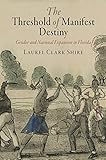The Threshold of Manifest Destiny : Gender and National Expansion in Florida / Laurel Clark Shire.
Material type: TextSeries: Early American StudiesPublisher: Philadelphia : University of Pennsylvania Press, [2016]Copyright date: ©2016Description: 1 online resource (288 p.) : 8 illusContent type:
TextSeries: Early American StudiesPublisher: Philadelphia : University of Pennsylvania Press, [2016]Copyright date: ©2016Description: 1 online resource (288 p.) : 8 illusContent type: - 9780812248364
- 9780812293036
- 975.9/04 23
- F315 .S55 2016eb
- online - DeGruyter
- Issued also in print.
| Item type | Current library | Call number | URL | Status | Notes | Barcode | |
|---|---|---|---|---|---|---|---|
 eBook
eBook
|
Biblioteca "Angelicum" Pont. Univ. S.Tommaso d'Aquino Nuvola online | online - DeGruyter (Browse shelf(Opens below)) | Online access | Not for loan (Accesso limitato) | Accesso per gli utenti autorizzati / Access for authorized users | (dgr)9780812293036 |
Browsing Biblioteca "Angelicum" Pont. Univ. S.Tommaso d'Aquino shelves, Shelving location: Nuvola online Close shelf browser (Hides shelf browser)

|

|

|

|

|

|

|
||
| online - DeGruyter Dispossessed Lives : Enslaved Women, Violence, and the Archive / | online - DeGruyter The Plantation Machine : Atlantic Capitalism in French Saint-Domingue and British Jamaica / | online - DeGruyter Beyond the Cloister : Catholic Englishwomen and Early Modern Literary Culture / | online - DeGruyter The Threshold of Manifest Destiny : Gender and National Expansion in Florida / | online - DeGruyter Historical Style : Fashion and the New Mode of History, 1740-1830 / | online - DeGruyter Pious Irreverence : Confronting God in Rabbinic Judaism / | online - DeGruyter Intimate Bonds : Family and Slavery in the French Atlantic / |
Frontmatter -- Contents -- Note on Terminology -- Introduction -- Part I. Slavery, Indian Removal, and Expansionist Domesticity -- Chapter 1. Property, Settlement, and Slavery -- Chapter 2. Innocent Victims of a ''Savage'' War -- Chapter 3. Seminole Resistance -- Part II. Gender and Pro-Settler Policy -- Chapter 4. Turning Sufferers into Settlers -- Chapter 5. Gender and Settler Colonialism -- Conclusion -- Appendix -- Notes -- Bibliography -- Index -- Acknowledgments
restricted access online access with authorization star
http://purl.org/coar/access_right/c_16ec
In The Threshold of Manifest Destiny, Laurel Clark Shire illuminates the vital role women played in national expansion and shows how gender ideology was a key mechanism in U.S. settler colonialism.Among the many contentious frontier zones in nineteenth-century North America, Florida was an early and important borderland where the United States worked out how it would colonize new territories. From 1821, when it acquired Florida from Spain, through the Second Seminole War, and into the 1850s, the federal government relied on women's physical labor to create homes, farms, families, and communities. It also capitalized on the symbolism of white women's presence on the frontier; images of imperiled women presented settlement as the spread of domesticity and civilization and rationalized the violence of territorial expansion as the protection of women and families.Through careful parsing of previously unexplored military, court, and land records, as well as popular culture sources and native oral tradition, Shire tracks the diverse effects of settler colonialism on free and enslaved blacks and Seminole families. She demonstrates that land-grant policies and innovations in women's property law implemented in Florida had long-lasting effects on American expansion. Ideologically, the frontier in Florida laid the groundwork for Manifest Destiny, while, practically, the Armed Occupation Act of 1842 presaged the Homestead Act.
Issued also in print.
Mode of access: Internet via World Wide Web.
In English.
Description based on online resource; title from PDF title page (publisher's Web site, viewed 30. Aug 2021)


